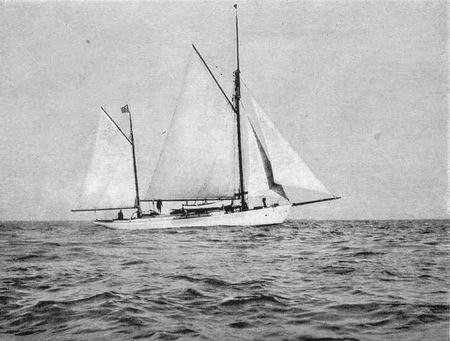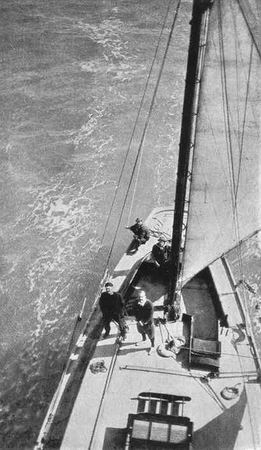|
1999-2003 (Return to Web Text-ures) |
Click Here to return to |
|
1999-2003 (Return to Web Text-ures) |
Click Here to return to |
XXIII
THE KETCH KONA
THE ketch Kona was designed for me by Commodore R. M. Munroe for the purpose of tarpon fishing in the rivers of Cuba.
She was built in Baltimore and is very strongly constructed of wood and is coppered.
Kona is 56 feet 6 inches on the waterline and 17 feet beam, and has a centre-board and a Craig gasolene engine of 25 horsepower.
Her draft is but four feet, for, although the rivers of Cuba are deep, there is a bar at the mouth of almost every river on which there is generally not much more than four feet of water at high tide.
The career of this little vessel is probably unique for in eight years she has sailed 38,917 sea miles. She has weathered the dreaded Cape Sable, Nova Scotia, eight times and has passed Cape Sable, Florida, even more often. She has rounded the inhospitable Cape San Antonio at the west end of Cuba fourteen times, and has made the voyage between New York and Key West eleven times.
She has also been to Antilla at the eastern end of Cuba, as far south as the Isle of Pines, and as far north as the Bay of Islands, Newfoundland—a record which I do not believe has ever been duplicated by a yacht of her size.
In the summer of 1909 she sailed from Baltimore to Bar Harbor, from there to Halifax, and to Canso, through the Bras d’Or lakes to Sidney, Cape Breton Island, and returned to New York by the same route.
In October of that year she sailed from New York for Key West, around the west end of Cuba to Batabano and the Isle of Pines. After cruising along the south coast of Cuba we returned to Key West. We were close hauled in a strong wind and heavy sea from Justias Key to Key West for 26 hours—180 miles. After cruising among the Keys she left for New York outside, sailing 1,063 miles from Miami to New York in 7 days, 18 hours, which is said to be a record.

KONA
In October, 1911, she left for Key West and continued on to Cienfuegos, Cuba. We cruised inside the reef along the south coast and returned to New York. In July we sailed for Dark Harbor, Maine, and later made Halifax, Port-aux-Basques, and Bay of Islands, Newfoundland, back to Port-aux-Basques, across to Sydney, through the Bras d’Or lakes, and returned to New York.
In 1912 she repeated her trip to Cienfuegos, Cuba, and return.
In 1913 she sailed for Cuba again, going as far as Cienfuegos, and returned to New York, and in July made a voyage as far east as Halifax, Nova Scotia, and back to New York.
In 1914 her trip was to the Isle of Pines, along the south coast of Cuba, and back to home waters.
In 1915, she returned to Cienfuegos, and on her journey north met with her first mishap, for she parted her weather shrouds in a heavy sea, sprung her mainmast, and had to return to Miami for a refit and a fresh start.
On the 9th of July at 9 P.M., when within sight of the lights of Bar Harbor, we were struck by a sudden storm “wind 70 miles an hour and heavy rain.” We were driven out to sea, lost the jiggermast, and had to cut away the launch. We limped into Bar Harbor the following evening at five o’clock after a very bad night at sea. After refitting we cruised to Lockport, Nova Scotia, and back to New York.

KONA FROM ALOFT
Kona sailed in November, 1916, for Key West and from there to Antilla, Cuba. We cruised along the north coast, stopping at Nuevitas and Matanzas. Sailing for Key West, we ran into a bad Norther and had to return to Cuba, but made Key West and Fort Myers, Florida, later on.
In 1917 we had a six weeks’ cruise along the south coast of Cuba and back to Fort Myers where the yacht was laid up on account of the war.
During all these trips Kona was commanded by Captain Thomas Dahlberg, a deep-sea sailorman who has great confidence in the little craft.
We were always on the hunt after fish and entered many rivers in Cuba looking for tarpon, with the result that we “jumped” and played 254 tarpon and took over 500 other large game fish.
|
SUMMARY Sea miles 1909-1910 6120 1910-1911 5071 1911-1912 6718 1912-1913 4559 1913-1914 5925 1914-1915 4442 1915-1916 4658 1917 1424 1918 760 1919 1548 40,225
|
Click
here to continue to the next chapter of
Some Fish and Some Fishing